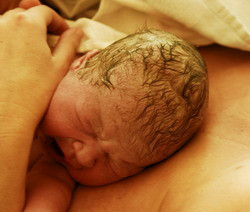A New Zealand study examining the neurodevelopmental effects on children exposed to methadone in the womb will begin in July after the Health Research Council of New Zealand (HRC) confirmed funding today.
University of Canterbury psychologist Dr Jacqueline Henderson has received a HRC Emerging Researcher First Grant to carry out the study, which will assess the effects of methadone exposure during pregnancy on children’s brain and nervous system development at age 9 years, including cognitive development, language, emotional and behavioural adjustment, and school achievement.
Dr Henderson will use longitudinal data of babies born to opiate-dependent mothers enrolled in methadone maintenance treatment during pregnancy. This data will be analysed alongside a randomly identified community sample of non-methadone exposed babies.
In New Zealand, as in the UK and Europe, opiates are one of the most serious and common drugs of abuse during pregnancy, with an estimated prevalence of 1 to 2 per cent.
“Methadone maintenance is the most widely used method of treating pregnant women with an opiate addiction,” says Dr Henderson. “Despite its widespread use, there is limited evidence of the effects of prenatal methadone exposure in infants, and even less evidence of later child health and neurodevelopmental outcomes.”
Dr Henderson says earlier study findings suggest that infants exposed to methadone are at higher risk of neurological disturbances; cognitive delay; poor psychomotor function and communication skills; and attentional, behavioural and emotional problems.
“Findings from this study will advance our scientific understanding of the complex processes that shape the development of these high risk children, and enhance our ability to develop more effective interventions to support the needs of these children and their families.”
Dr Henderson is one of 14 researchers to receive an Emerging Researcher First Grant in the HRC’s 2014 funding round. The full list of recipients is available below.
“It’s very satisfying to be able to support the career development paths of such a talented pool of emerging researchers through these grants. The outcomes from the diverse range of projects funded will benefit both the short and long-term health of New Zealanders,” says HRC Board Chair Sir Robert Stewart, KNZM.
Emerging Researcher First Grants 2014
Dr Katherine Black, University of Otago, Dunedin
Which diet? Dietary interventions and blood pressure
24 months, $149,994
Dr Allan Gamble, University of Otago, Dunedin
Bioorthogonal prodrug activation for targeted chemotherapy
36 months, $144,275
Dr Natasha Grimsey, the University of Auckland
Characterising cannabinoid receptor 2 polymorphisms implicated in mental illness
36 months, $149,732
Dr Elena Harjes, Massey University, Palmerston North
Screening for APOBEC3B inhibitors: a new approach to fighting breast cancer
24 months, $150,000
Dr Jacqueline Henderson, University of Canterbury
Neurodevelopmental outcomes of children exposed to methadone during pregnancy
24 months, $146,243
Dr Christopher Jackson, University of Otago/Southern District Health Board, Dunedin
Primary rectal cancer management in advanced disease with chemotherapy
36 months, $145,529
Dr Joanna James, the University of Auckland
Growing better placentas for healthy babies
36 months, $139,550
Dr Nicola Kayes, AUT University
Implementing new ways of working in physiotherapy practice to optimise outcome
24 months, $149,203
Dr Sandra Mandic, University of Otago, Dunedin
Built environment and active transport to school: BEATS parental survey
36 months, $149,941
Dr Ninya Maubach, University of Otago, Dunedin
Heuristics in the supermarket: Do food labels support healthy choices?
36 months, $109,940
Dr Tracy Melzer, University of Otago, Christchurch
Tracking cognitive decline in Parkinson's disease with serial MRI
36 months, $149,943
Dr Ehsan Vaghefi, the University of Auckland
Digital design of therapies to combat age related nuclear cataracts
36 months, $141,000
Dr Larah van der Meer, Victoria University of Wellington
Assistive communication technology for adults with intellectual disability
18 months, $150,000
Dr Emma Wyeth, University of Otago, Dunedin
Māori disability outcomes: Pathways and experiences after injury
36 months, $149,410
